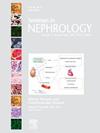血液透析中肝素抗凝的实验室监测:原理与策略。
IF 2.8
3区 医学
Q2 UROLOGY & NEPHROLOGY
引用次数: 0
摘要
通常使用非减量肝素(UFH)和低分子量肝素(LMWH)来防止血液透析体外循环凝血,并优化血液透析的充分性。关于血液透析期间 UFH 和 LMWH 的最佳剂量,目前尚未达成共识。在临床实践中,对透析器和静脉腔进行半定量凝血评分有助于指导 UFH 和 LMWH 的剂量调整。实验室监测并未证明可改善临床效果,因此并不适用大多数血液透析患者。不过,对于特定患者,如体重超标或有反复凝血或出血史的患者,可以考虑进行实验室监测。实验室监测方法包括活化部分凝血活酶时间、活化凝血时间、UFH 的抗因子 Xa 检测和 LMWHs 的抗因子 Xa 检测。血液透析中的抗凝目标范围已经提出,但尚未明确定义。在使用这些检测时,必须考虑到可用性、标准化、干扰因素和解释等问题。在本综述中,我们将讨论血液透析中抗凝血监测的原理和方法。本文章由计算机程序翻译,如有差异,请以英文原文为准。
Laboratory Monitoring of Heparin Anticoagulation in Hemodialysis: Rationale and Strategies
Unfractionated heparin (UFH) and low-molecular-weight heparins (LMWHs) are commonly used to prevent clotting of the hemodialysis extracorporeal circuit and optimize hemodialysis adequacy. There is no consensus on the optimal dosing for UFH and LMWHs during hemodialysis. In clinical practice, semiquantitative clotting scoring of the dialyzer and venous chamber may help to guide UFH and LMWH dose adjustment. Laboratory monitoring has not been shown to improve clinical outcomes and is therefore not routinely indicated in most hemodialysis patients. It might, however, be considered in select patients, such as those with extremes of body weight or history of repeated clotting or bleeding. Methods for laboratory monitoring include the activated partial thromboplastin time, activated clotting time, and antifactor Xa assays for UFH and antifactor Xa assay for LMWHs. Target ranges for anticoagulation in hemodialysis have been suggested but not clearly defined. When utilizing these tests, issues such as availability, standardization, interfering factors, and interpretation must be considered. In this narrative review, we discuss the rationale and methods of monitoring anticoagulation in hemodialysis.
求助全文
通过发布文献求助,成功后即可免费获取论文全文。
去求助
来源期刊

Seminars in nephrology
医学-泌尿学与肾脏学
CiteScore
5.60
自引率
0.00%
发文量
27
审稿时长
6-12 weeks
期刊介绍:
Seminars in Nephrology is a timely source for the publication of new concepts and research findings relevant to the clinical practice of nephrology. Each issue is an organized compendium of practical information that serves as a lasting reference for nephrologists, internists and physicians in training.
 求助内容:
求助内容: 应助结果提醒方式:
应助结果提醒方式:


